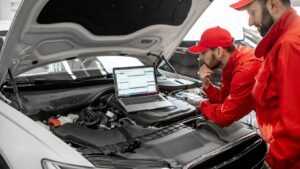Beneath the hood of every car lies a complex, intricate world that only a skilled few can navigate. Enter the automotive technician, a master of this mechanical labyrinth. They’re the unsung heroes who keep our vehicles running smoothly, diagnosing and repairing issues with the precision of a surgeon.
Their role is evolving with the advent of electric and autonomous vehicles, making their expertise more vital than ever. They’re not just mechanics, but technologists, adapting to the rapid changes in the automotive industry. This article delves into the exciting, challenging world of the automotive technician, shedding light on the skills, training, and adaptability required in this dynamic profession.
Automotive Technician
 Emerging developments in the automotive field have inevitably reshaped the role of automotive technicians.
Emerging developments in the automotive field have inevitably reshaped the role of automotive technicians.
This evolution has been marked by a shift from traditional mechanical roles to technologically inclined ones, necessitating adaptations in training, skills, and outlook.
From Mechanics to Technicians
Long gone are the days of the grease monkey. Today’s position of the mechanic, now referred to as an automotive technician, involves a sophisticated understanding of complex systems and software.
Accompanying this skill set, tedious handwork has been replaced by advanced tools and diagnostic equipment, transforming shops into high technology spaces. The automotive technician of the 21st century, for example, spends more time behind a computer screen than under a car hood.
Impact of Technology on Automotive Careers
The proliferation of technology in the automotive industry has led to significant changes in automotive careers. Technicians now use high-tech equipment to analyze, service, and repair vehicles. This equipment includes state-of-the-art computerized diagnostic tools, which have become a mainstay in most repair shops. These advances necessitate that technicians possess a combination of old-school mechanical knowledge and understanding of modern technology to optimize vehicle performance.
Training and Education for Automotive Technicians
 In the new era of tech-related automotive industry, training and education for automotive technicians has undergone significant transformations.
In the new era of tech-related automotive industry, training and education for automotive technicians has undergone significant transformations.
Acquiring relevant knowledge and fostering advanced skills forms an integral part of an automotive technician’s journey towards expertise.
Required Certifications and Degrees
Gone are the days when hands-on experience in a garage sufficed to become an automotive technician. Now, credentials play a vital role in obtaining a job in this field. A high school diploma or equivalent, coupled with post-secondary vocational education, is the initial step towards this profession.
Automotive Service Excellence (ASE) certification constitutes a standard credential in the USA. It’s provided by the National Institute for Automotive Service Excellence, a reputable entity in the industry, across a variety of specializations like Automotive, Collision, and Big Rig.
Continuing Education and Specializations
Supplementing primary education, ongoing learning offers automotive technicians the opportunity to stay up-to-date with emerging trends and technologies in the automotive industry. Professional development usually includes gaining advanced certifications and attending training workshops focusing on particular vehicle systems.
 Master technicians, those at the top echelon of the profession, usually possess a comprehensive roster of certifications and specialties. Acquiring knowledge in areas such as electric and hybrid vehicles, autonomous driving technologies, advanced diagnostic tools, and computer systems adds a compelling portfolio for any contemporary automotive technician.
Master technicians, those at the top echelon of the profession, usually possess a comprehensive roster of certifications and specialties. Acquiring knowledge in areas such as electric and hybrid vehicles, autonomous driving technologies, advanced diagnostic tools, and computer systems adds a compelling portfolio for any contemporary automotive technician.
In essence, continuing education and specialization, paired with valuable certifications, lay the foundation for a successful career as an automotive technician in the modern scenario.
Challenges Facing Today’s Automotive Technicians
Increasing advancement in automobile technology poses fresh challenges to contemporary automotive technicians.
Here, we delve into the specific issues they’re likely to encounter in their line of work today.
Keeping Up with Advancing Technology
Keeping pace with rapidly changing technology presents one of the significant hurdles for today’s automotive technicians. Emerging trends, such as self-driving cars, electric vehicles (EVs), and Internet of Things (IoT) applications in automotives (example: smart infotainment systems), demand a new realm of knowledge and skills.
Automotive technicians must not only understand complex electronic systems but also be adept in using advanced diagnostic tools and latest software applications. The challenge here lies in the rapid pace of these innovations, demanding continuous learning and skill adaptation from the technicians.



